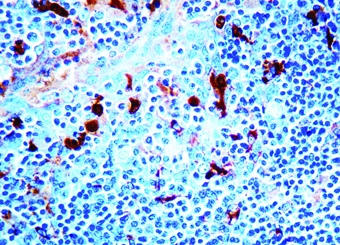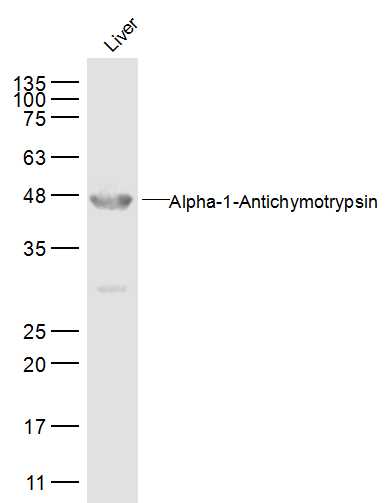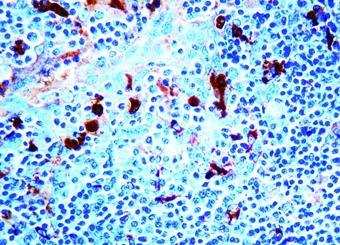
IHC-P analysis of human tonsil tissue using GTX20921 alpha 1 Antichymotrypsin antibody (ready-to-use).
alpha 1 Antichymotrypsin antibody (ready-to-use)
GTX20921
ApplicationsImmunoHistoChemistry, ImmunoHistoChemistry Paraffin
Product group Antibodies
ReactivityHuman
TargetSERPINA3
Overview
- SupplierGeneTex
- Product Namealpha 1 Antichymotrypsin antibody (ready-to-use)
- Delivery Days Customer9
- Application Supplier NoteIHC-P: . *Optimal dilutions/concentrations should be determined by the researcher.Not tested in other applications.
- ApplicationsImmunoHistoChemistry, ImmunoHistoChemistry Paraffin
- CertificationResearch Use Only
- ClonalityPolyclonal
- ConjugateUnconjugated
- Gene ID12
- Target nameSERPINA3
- Target descriptionserpin family A member 3
- Target synonymsAACT, ACT, GIG24, GIG25, alpha-1-antichymotrypsin, cell growth-inhibiting gene 24/25 protein, growth-inhibiting protein 24, growth-inhibiting protein 25, serine (or cysteine) proteinase inhibitor, clade A, member 3, serpin A3, serpin peptidase inhibitor, clade A (alpha-1 antiproteinase, antitrypsin), member 3
- HostRabbit
- IsotypeIgG
- Protein IDP01011
- Protein NameAlpha-1-antichymotrypsin
- Scientific DescriptionThe protein encoded by this gene is a plasma protease inhibitor and member of the serine protease inhibitor class. Polymorphisms in this protein appear to be tissue specific and influence protease targeting. Variations in this proteins sequence have been implicated in Alzheimers disease, and deficiency of this protein has been associated with liver disease. Mutations have been identified in patients with Parkinson disease and chronic obstructive pulmonary disease. [provided by RefSeq, Jul 2008]
- ReactivityHuman
- Storage Instruction2°C to 8°C
- UNSPSC12352203






